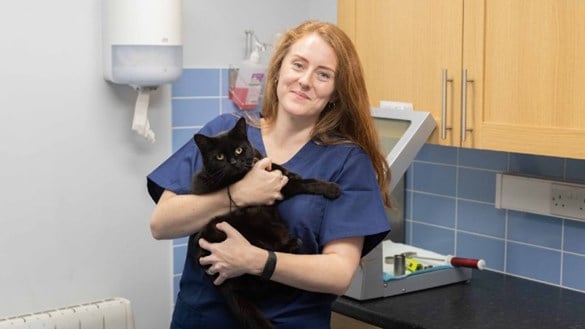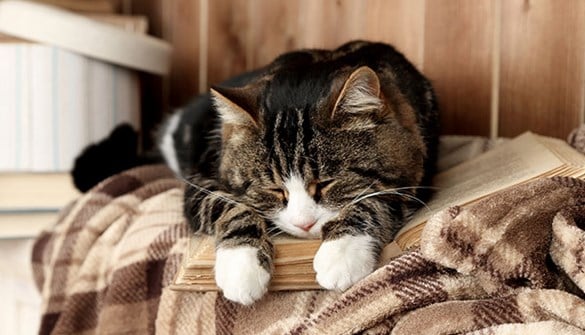Hyperthyroidism In Cats
Hyperthyroidism in cats, or an overreactive thyroid, is extremely common as cats get older. Find out what causes the condition and how to treat it.
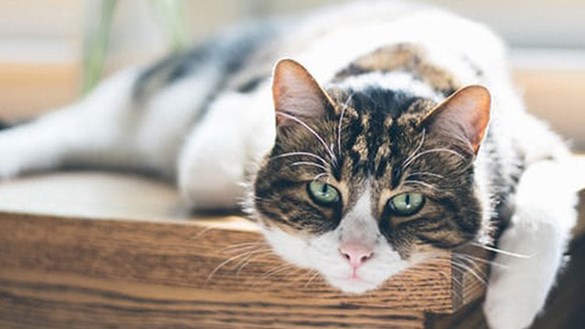
What is feline hyperthyroidism?
Hyperthyroidism, otherwise known as an overactive thyroid, is where the thyroid glands in the neck develop abnormal tissues which increase the production of thyroid hormones. These hormones are responsible for regulating many processes in the body, including your cat’s metabolism, and when too much is produced, your cat can become seriously ill.
Feline hyperthyroidism is very common in older cats, the average age of a cat that develops the condition is between 12 and 13 years. If left untreated, the issue can cause serious problems for your cat's heart and kidneys.
Causes of hyperthyroidism
In most cases, hyperthyroidism is caused by benign growths called an adenoma. While the underlying cause of this growth is still unknown, it could be a result of the cat’s diet or their environment.
In very rare cases (less than one to two per cent), a malignant tumour can be the underlying cause of the condition.
Symptoms of hyperthyroidism in cats
Symptoms of hyperthyroidism are usually subtle to begin with, becoming more severe as the condition worsens.
These symptoms include:
- Weight loss
- Increased appetite and/or thirst
- Increased activity, restlessness or irritability
- Increased heart rate
- Poor condition of fur or skin
Other symptoms of hyperthyroidism in cats may include moderate diarrhoea and vomiting, and some may be noticeably intolerant of heat. In advanced cases of hyperthyroidism, your cat may even pant when they’re stressed.
Effects of hyperthyroidism in cats
If left untreated, hyperthyroidism can cause an increased heart rate and changes to the wall of the heart; this can subsequently lead to heart failure.
Although less common, an overactive thyroid can also cause high blood pressure which can cause damage to the eyes, kidneys, heart and brain.
While kidney disease is not a direct result of hyperthyroidism, it’s common as cats get older, so the two conditions are often present at the same time. If so, extra care is needed as an overactive thyroid can affect kidney function.
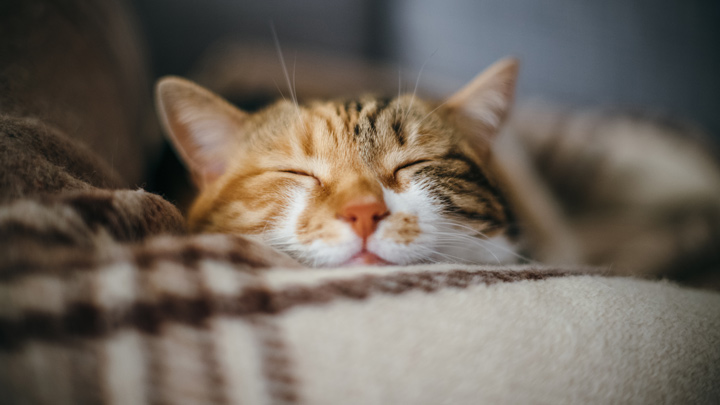
Treating hyperthyroidism
Thankfully, feline hyperthyroidism can be treated successfully through various methods to suit the individual case: medication, radioactive iodine therapy, surgery or diet.
Medicine
A daily dose of anti-thyroid medication (available as tablets or liquid) blocks the excessive production of the thyroid hormone, therefore keeping the condition under control. It’s important to remember that these medications don’t cure the condition and they need to be taken for the rest of your cat’s life, along with regular monitoring tests with a vet. However, many cats live long and happy lives on this treatment.
Surgery
Removing the affected tissues in an operation called a thyroidectomy is a common long-term or permanent solution. All animals have two thyroid glands, and either one or both can be removed depending on their condition. After the surgery, your vet may recommend regular blood tests to check the hormone levels are normal. Hypothyroidism, or an underactive thyroid, can sometimes develop from this surgery and while side effects are rare, your cat may experience loss of appetite, vomiting and tiredness.
Radioactive iodine therapy
Radioactive iodine therapy involves a simple injection under the skin which is absorbed by the abnormal thyroid tissue. The radioactive iodine destroys the affected tissues without harming the surrounding glands or tissues. This safe and effective treatment has a high success rate but is only available at specialist centres (including Medivet 24 Hour Enfield) - it can be expensive and requires hospitalisation for three to six weeks.
Diet
Following a special diet with controlled iodine levels (which the thyroid needs to make hormones) can help manage hyperthyroidism. It’s imperative that cats on this form of treatment stick to the diet exclusively to ensure its success – this can be difficult if your cat goes out.
Can cats have underactive thyroids?
While an underactive thyroid, or hypothyroidism, is common in dogs, the condition is incredibly rare in cats. When hypothyroidism is seen in cats, it’s usually as a result of surgery to treat an overactive thyroid.
If you have any concerns about your cat, you should always speak to your vet.
Hyperthyroidism in cats FAQ
There’s no definitive cause of hyperthyroidism in cats, though sometimes it can be caused by a tumour. It is a condition that is linked to older cats. There is some speculation that it’s caused by diet or environment, but this hasn’t been proven.
Yes, there are a few different options to treat hyperthyroidism in cats, including radioactive iodine (available in some Medivet practices), surgery, or medicine. Your vet will discuss the best course of treatment for your cat with you, so you can make an informed decision.
The symptoms of hyperthyroidism in cats are weight loss despite increased appetite, increased energy or restlessness and changes to the condition of their fur or skin. There could be other symptoms, but if you notice any changes in your cat’s behaviour, you should always ask advice from a vet.
Medication for hyperthyroidism is adjusted to effect. This may mean that the dose will be adjusted within the initial few weeks. Regular monitoring blood tests will show if a dose adjustment is needed.
Signs of hyperthyroidism may include weight loss, increased appetite, increased thirst, increase activity and restlessness, an increased heart rate and a poor and unkempt coat.
Once on the appropriate dose of treatment cats will usually have complete reversal of all of the signs of hyperthyroidism.
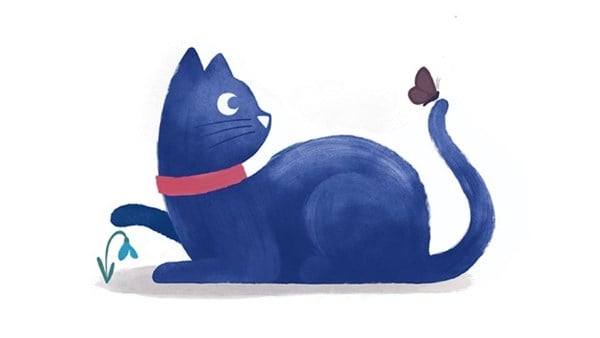
Senior Cat Healthcare Plan
Our senior healthcare plan includes all the benefits of the adult plan, plus a few extra checks to help keep your cat stay healthy and thriving in their older years.
Learn more

